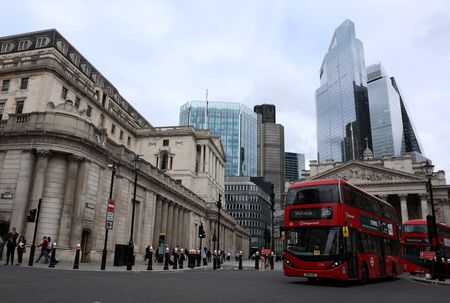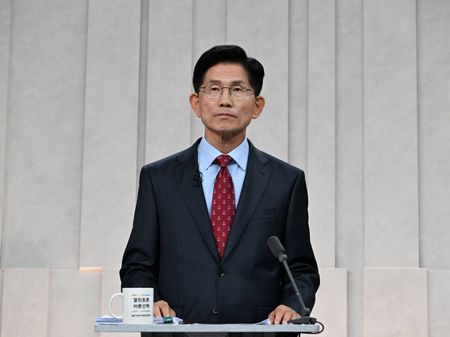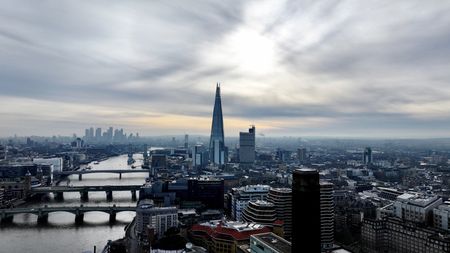By Andy Bruce
(Reuters) -Tepid growth across British businesses edged up at the start of 2025 but employment and optimism contracted again and price pressures rose, according to a survey that underscored the challenge facing the Bank of England.
The preliminary “flash” reading of the UK S&P Composite Purchasing Managers’ Index (PMI) – published on Friday – rose slightly to 50.9, a three-month high, from 50.4 in December.
Economists polled by Reuters had expected a further decline in January to 50.0, the PMI’s dividing line between growth and contraction.
The survey chimed with other signs of lacklustre growth and a weakening jobs market since finance minister Rachel Reeves raised payroll tax rises for businesses in her first budget on Oct. 30.
Separate data published on Friday showed retailers reported a sharp fall in sales volumes in January while consumer confidence fell abruptly.
British government bond prices dropped after the PMI was published as investors homed in on the survey’s gauges of price pressures. Sterling rose slightly against the dollar.
“Today’ data release won’t alleviate the Bank of England’ concerns about the weakness of activity,” said Elias Hilmer, economist from consultancy Capital Economics.
“We still think the Bank will cut interest rates from 4.75% now to 4.50% in February, but the strengthening in price pressures suggest it will cut rates only gradually thereafter.”
S&P Global said many firms linked the fall in hiring to the hike in their social security contributions announced by Reeves.
The pace of job losses reported by the PMI over the past two months was the highest since the global financial crisis in 2009, excluding the COVID pandemic period.
Optimism among companies fell to the lowest level since late 2022, shortly after former prime minister Liz Truss’s “mini-budget” which shocked financial markets.
“Inflation pressures have…reignited, pointing to a stagflationary environment which poses a growing policy quandary for the BoE,” said Chris Williamson, chief business economist at S&P Global Market Intelligence.
The PMI’s gauges of costs faced by businesses and selling prices surged to their highest levels since mid-2023, something that is likely to feature in the BoE’s discussions before its Feb. 6 interest rate decision.
Input costs are rising faster in Britain than in Germany, France and Japan.
Investors are pricing in between two and three quarter-point rate cuts by the BoE in 2025 as inflation pressures remain sticky, with the first looking likely in February.
Official data has shown Britain’s economy stagnated in the three months to September and the BoE has estimated that it flatlined again in the last three months of 2024.
S&P Global said its UK services PMI also rose to a three-month high of 51.2, up from December’s 51.1. But manufacturing shrank for a fourth month running and factory employers cut jobs at the fastest pace since February 2024. However, the sector’s PMI rose to 48.2 from 47.0.
(Reporting by Andy Bruce; Editing by Toby Chopra)











